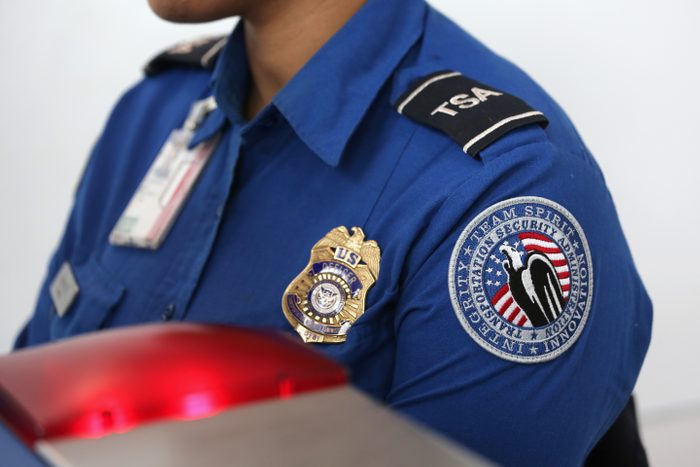While it's nice to be noticed, this isn't the kind of attention you want. Here's what to avoid if you want to fly through the airport security check.
This Is What a TSA Agent First Notices About You
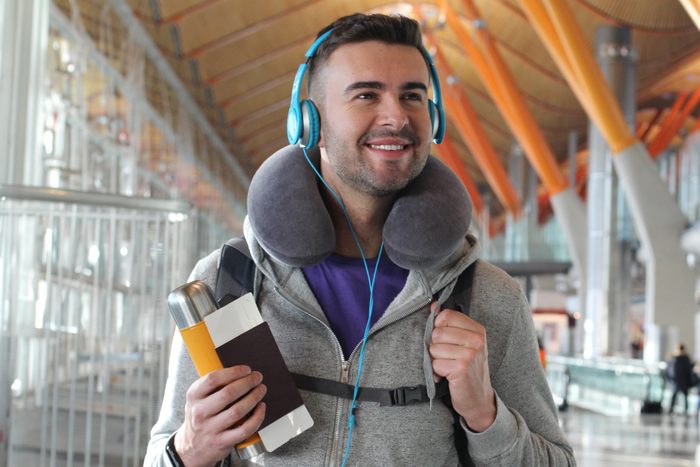
Not listening
Whether it’s your first time or your 100th time going through airport security, you still need to pay attention to the directions from the TSOs. “People not paying attention is my top pet peeve and we definitely notice if you’re not listening—because then you mess up and we have to explain it to you again, which wastes everyone’s time,” he says. It’s okay to make mistakes, no one expects you to be perfect, but following basic instructions is Traveling 101. If listening isn’t your preferred way to get information, Delgado points out that everything is also printed on signs posted throughout the security checkpoints, often in multiple languages.
Not listening won’t necessarily get you selected for a pat-down, but trying to carry a pocket knife through the body scanner because you weren’t paying attention when they told you to empty your pockets just might.
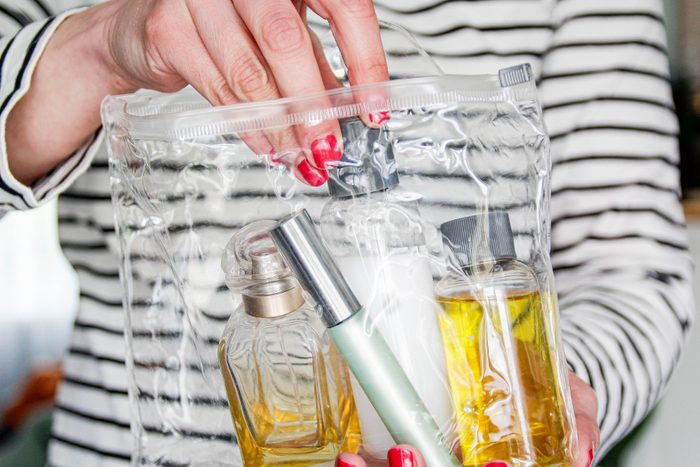
Offering gifts
You left a beautiful bottle of wine or an opened can of Red Bull in your carry-on. You can’t take it through security so why not gift it to the TSO? Or you buy an extra iced coffee to hand to the TSO. You’re just trying to be kind to someone and say thanks, right? While these are nice gestures, TSOs aren’t allowed to accept any gifts from passengers, no matter how big or small they are.
“We actually aren’t allowed to accept anything free from anyone in the airport, including vendors, because it can look like a bribe,” Delgado says. “And don’t ever tell me, ‘just take it quick, no one will see’ because there are cameras covering every square inch and I will get in trouble. Accepting a gift is one of the fastest ways to get fired.”
If you keep insisting or try to push the item into their hands, that can even trigger a call to the supervisor.
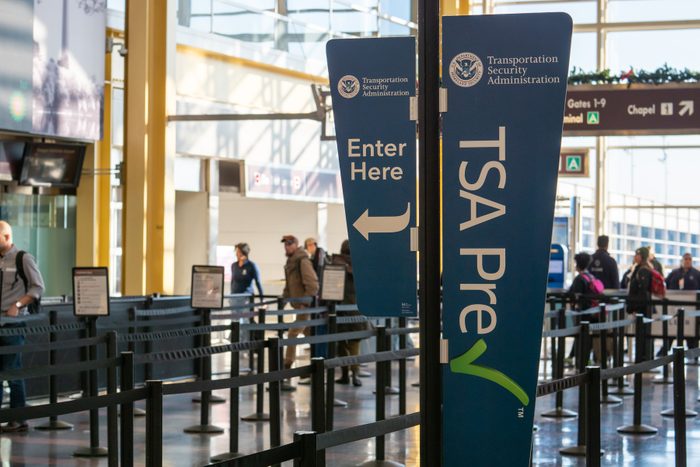
Thinking you’re a special case
“If everybody else in front of you is emptying their pockets and taking off their shoes, then just by common sense, you should know you have to do it too,” Delgado says. “Yet there are so many people who want us to give them special treatment. You’re not special.” While there are some circumstances that will warrant an exception—for instance, breast milk is an exception to the “no liquids” rule—simply being inconvenienced isn’t a good reason. And adding, “Jeez, do I look like a terrorist to you?!” will definitely not help your case. “We don’t profile people, so you need to let go of this idea of what a terrorist looks like,” he adds. “Not to mention, a terrorist can look like anyone.”
Feel free to ask a nearby TSO for clarification, they are more than happy to answer questions, he says, but don’t argue the rules with them. And note that having TSA PreCheck also doesn’t exempt you from all the rules, he adds. It helps you get through security faster via shorter lines and more efficient processes but you’ll still have to do the same safety precautions (like emptying your pockets, removing jackets etc.) as everyone else, he says.
This isn’t just an annoyance, however. Acting like a Plane Princess or Prince can draw extra attention to you from TSOs. If you resist following mandatory safety protocols the TSO will call their supervisor who then may pull you aside for an extra check, he says.
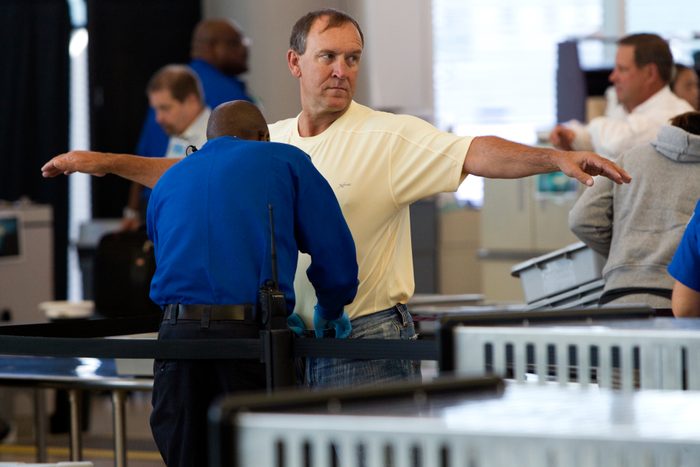
Fighting a pat down
Pat downs and searches are one of the things people get most wrong about airport security. “One of the biggest myths is that we do ‘strip searches.’ That’s not a thing! People have seen too many movies, Hollywood always gets this wrong,” Delgado says. These misconceptions can make people nervous or angry and try to get out of extra screening which just makes it harder for everyone.
Contrary to popular belief, extra searches that aren’t triggered by an item alerting in the body scanner are randomly chosen by the computer. Getting selected doesn’t mean you look like a bad person or you’re automatically in trouble. And know that the TSOs don’t choose it, can’t change it, and have to follow it, he says, so arguing about it gets you nowhere.
Rest assured though, searches are performed by a same-gender TSO, they can only use the back of their hand, and they have to explain everything as they’re doing it. You can ask for a private pat down if you prefer and will be taken to a different room. (This is a great way to talk to a TSO in private, for instance, should you or someone you know be a victim of sex trafficking.)
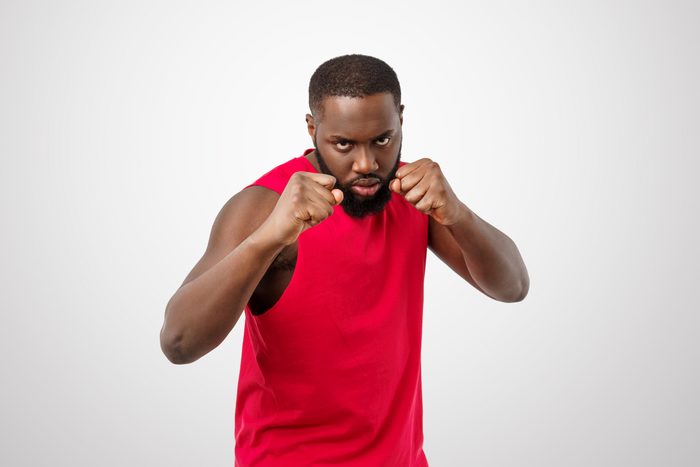
Acting aggressive
The last thing you want to do is draw attention to yourself at the airport by being belligerent, angry or downright nasty. “It sends up a red flag, and TSA agents begin to wonder what the issue is,” says Price, a former assistant security director for the Denver Airport who is now a security trainer for the American Association of Airport Executives and a professor of airport management at the Metropolitan State University of Denver. “If your flight has been delayed or canceled, don’t let that put you in a tailspin.”
Delgado adds that he’s seen people lose their cool in every imaginable way and normally he doesn’t take it personally. “We see a lot of crabby passengers, sometimes they’ll call us names or whatever, and that doesn’t bother me. I understand they’re just frustrated,” Delgado says. It becomes a problem when people get physical—pushing or throwing things, try to get around security features, or act in any way that becomes unpredictable and scary.
Price explains that TSA screeners primarily look for behaviors that are inconsistent with typical passenger commuters. So do your best to stay calm, cool and collected—even when you’re frustrated by airport issues.

Being overly talkative
Feeling chatty and want to break the ice with TSA officers? Resist the urge to charm them with all the airplane facts you know. Making small talk with TSA employees isn’t always a good idea, says Price. “Many criminals try to avert the attention of security agents using this approach,” he says. “So being overly talkative may be a red flag.” Avoid being overly familiar or asking personal questions.
However, Delgado adds that it’s okay to be friendly. “We appreciate it, especially if lines are short and we’re not busy,” he says. “Just be sure to keep the line moving, don’t stop to talk to us.”
It’s about finding the right balance. Regardless, you should make it a point to be courteous and polite, smile and say ‘thank you’—after all, having the right attitude can make all the difference.
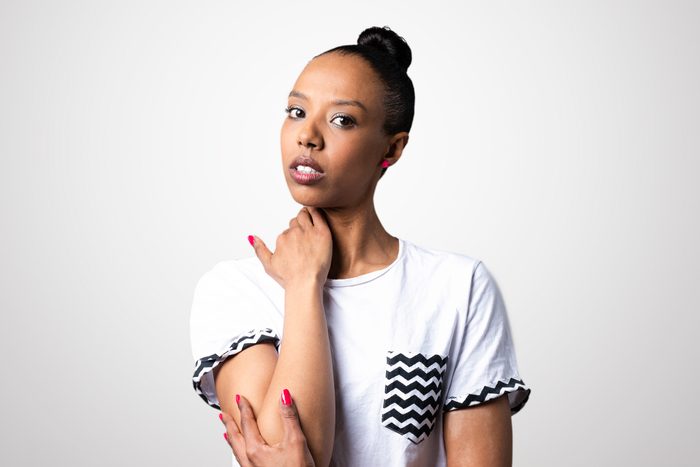
Acting nervous
Eyes darting around, sweating, throat clearing, fidgeting, stammering, and breathing heavy or fast are all signs of anxiety. You may be displaying these signs because you have a fear of flying. Or you may be nervous for another, not-so-innocent reason. And it’s up the TSO to figure out which one it is. The TSA has been trained to be on the lookout for nervous passengers. Anything that makes you look agitated could attract the attention of a TSA agent.
“We won’t pull you aside just for being nervous but we may start to pay more attention to you,” Delgado says. “If things don’t feel right, I’ll call my supervisor and ask them to keep an eye on you, looking for other red flags.”
This may help you as a passenger, if you have a private concern you want to share with a TSO, he adds. “There was a time a kid came through my line who was clearly very agitated, very nervous, so I went over to him and asked if he’s okay. He whispered that he had a vape in his pocket but his parents didn’t know he smokes and he didn’t want to take it out for security,” he shares. “I offered him a private screening which he took me up on.”
Nervous flyers may want to find ways to calm themselves (such as by meditating or visualizing a calm, safe experience) before hitting the airport security check.
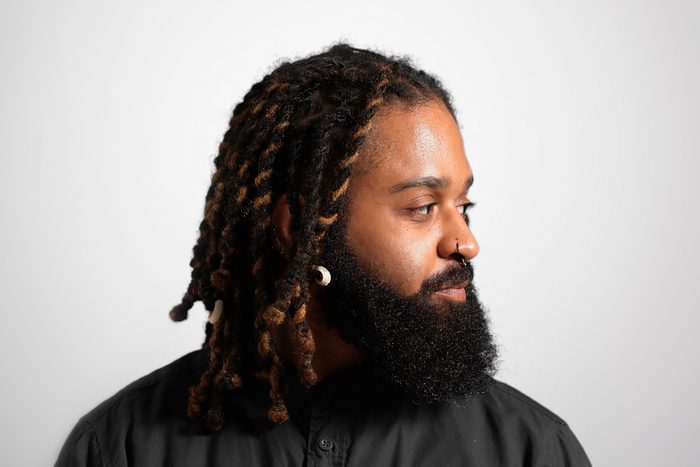
Avoiding eye contact
Perhaps you have other things on your mind—like all that traveling you’re about to do. Or maybe you’re just an introvert and don’t particularly like interacting with strangers. But to a TSA agent, your avoidance of eye contact could signify something else entirely, says former TSA agent Richard Rozins. “The eyes are the first place a TSA agent looks,” he says.
If you’re unable to look TSA agents in the eye when they are asking you a question, it may seem like you are avoiding or hiding something, adds Price.
This alone isn’t an ominous sign but it is a telltale one and will alert the agent to be more aware of you, Delgado says. “I may ask them a few more questions, about where they are traveling or what they are doing, to get a feel for them,” he says.
He adds that this is something that also alerts him to dangerous situations like a kidnapping or trafficking situation. He shares an experience where a family came through his line and none of the kids would speak or make eye contact. “We all noticed them that day but didn’t have enough reason to stop them so we let them go, a decision that still haunts me,” he says. Why? That “family” ended up on the news as trafficking and abusing children.
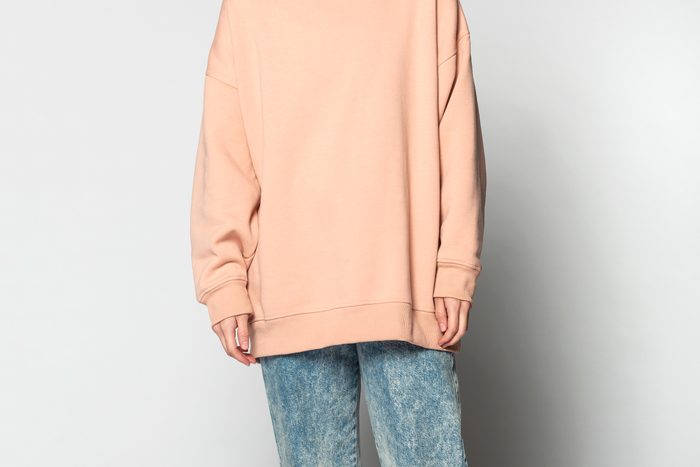
Wearing baggy clothing
Baggy clothes are comfortable, and frequent flyers know that comfort is king when it comes to determining what to wear on an airplane. But loose duds may prompt an extra screening as you move through airport security. While they’re not prohibited, baggy clothes may make TSA agents wary because they can’t tell what you might be hiding underneath. They may even need to pat you down.
“This is why we ask people to remove jackets, suit coats, shirts tied around their waist, things like that,” Delgado says. “But with the new Body Scanners, this is less of a problem. Believe me when I tell you they can see everything regardless of how much clothing you got on. Which, again, is why it is so important to take everything out of your pockets. Like we told you ten times.”
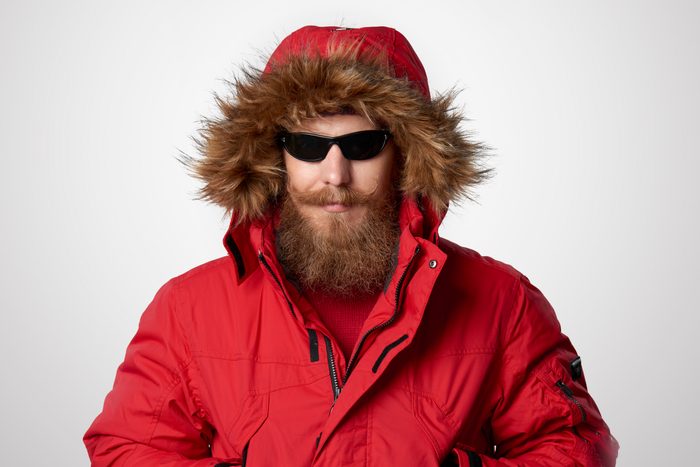
Wearing unseasonable outfits
Any behavior that is out of the norm—including wearing a ski parka in July—is a red flag, Delgado says. The screening pro who is on the lookout for criminals may wonder if you’re hiding something. Is the parka you’re wearing in 90-degree heat concealing a weapon? It’s the sort of question a TSO may ask when scanning the airport security check line. Yes, you’ll be removing your jacket and going through the body scanner, but you may have pinged the TSA radar by then. As a result, TSOs may decide to do a bag search or even pat you down after you go through the body scanner.
If it’s a matter of necessity—where else are you going to put your jacket?—it may be time to invest in some affordable luggage that you can pack with extras and check before heading to security.
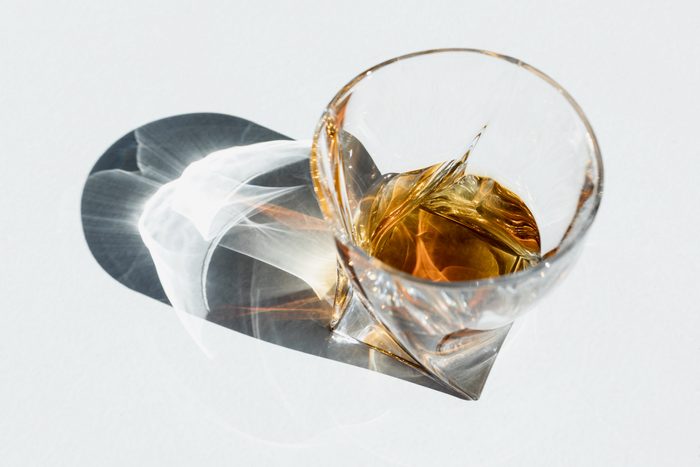
Drinking before your flight
The Federal Aviation Administration (FAA) and airport security have zero tolerance for unruly passenger behavior—and that includes drunkenness. Since the COVID-19 pandemic began, incidents of abuse by travelers at airports and on flights have risen dramatically. According to the FAA, there have been more than 7,000 reports of unruly passengers since the start of 2021. In response, lawmakers in the House of Representatives have filed a bill known as the Unruly Passenger Restraint Review Act to ban passengers who act out on flights.
If a TSO senses that you’re intoxicated, you could be deemed a person of interest or even stopped from proceeding.
“Oh, I’ve totally had to tell people that they were too drunk to fly,” Delgado says. “I call my supervisor who will escort them out. The thing is even if I let you through, the gate agent probably won’t let you board.” If you do make it onto the plane, intoxication is one of the first things a flight attendant will notice about you.
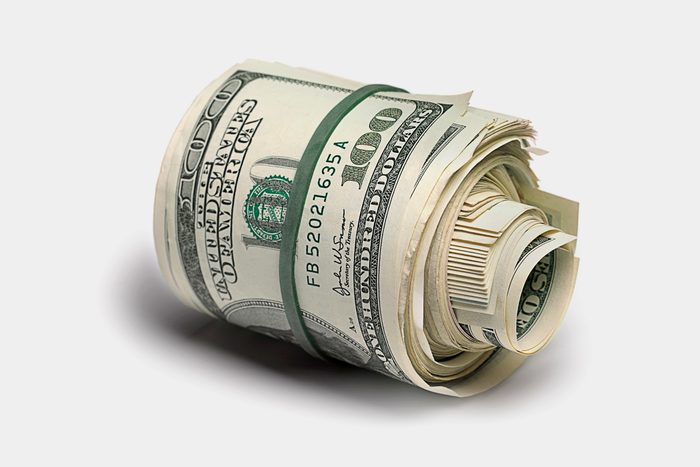
Carrying lots of cash
Globetrotters who carry a lot of cash—including a wad of foreign currencies and coins—may be surprised to know they can get flagged by a TSA agent. It’s happened many times to Sahara Rose De Vore, a wellness travel coach and consultant who has visited more than 80 countries. “I’ve been asked at many airport security checkpoints to explain why I have multiple currencies,” she says. “They are worried about sex trafficking, and this is something they often want to ask you about.”
According to De Vore, TSA agents may ask why you traveled to various places and whom you work for. Her advice: Convert the money back to U.S. dollars, or your native currency, at the end of your trip.

Traveling with coffee
You may think a bag of coffee beans is a great travel gift or souvenir, but drug smugglers use coffee to hide the scent of drugs from TSA canines. Because it’s a common tactic used by criminals, it’s a red flag for TSA officers, says Price. If they see coffee beans in your carry-on luggage, they may question you or search your bag by hand. The TSA doesn’t prohibit coffee beans or ground coffee from either carry-on or checked bags, but you may want to buy it in the duty-free shop to avoid any hiccups.
Also, if the TSA canines are around, resist the urge to pet, talk to, or otherwise distract them, Delgado says. He adds that they’re usually only used to sniff for explosives in the main areas of the airport but may alert for drugs as well, although that’s more common in Customs for international flights.
If you’re set on bringing home coffee from your destination, separate the item when going through the security check. You want to make sure it doesn’t obscure the image on the X-ray machine.
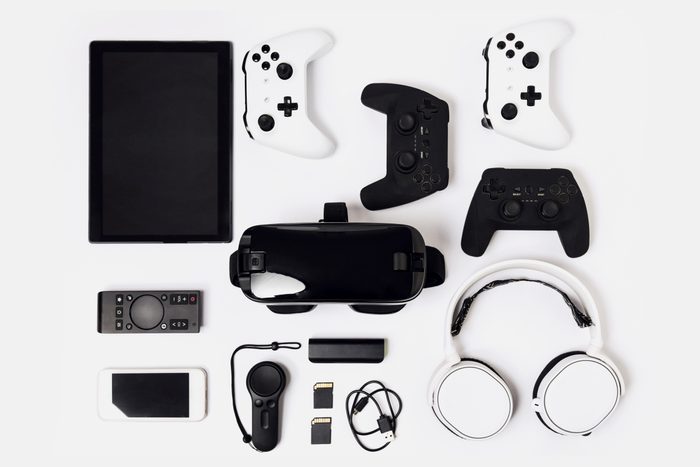
Traveling with electronics and electrical equipment
The TSA requires that all electronics bigger than a cellphone, such as laptops and tablets, be placed in bins and X-rayed separately. Most travelers are aware of that. But many don’t know about the other items that can trigger a search. “I always get flagged for my curling iron,” says De Vore.
“It’s a common misconception that our scanners are metal detectors. They’re not,” Delgado says. “So we’re not just looking for electronics with a lot of metal but all electronics need to be taken out of your bag, even charging cords.”
It’s best to review the TSA’s rules on all the items you’re packing in your luggage. The administration has special instructions for certain items—yes, even curling irons and hair dryers. Want to skip the hassle? TSA PreCheck enables travelers to keep their electronics in their carry-on bags when going through security.

Wearing intricate hairdos
It’s not just me who has set off alarms with their hair. Here’s something TSA agents might not tell you: It’s best to wear your hair down. However convenient off-the-face styles may be, they’re not ideal for the airport security check. According to the TSA, there’s a reason why intricate styles—like braids, updos and hairpieces—could get a second look. Bobby pins, clips, wigs, extensions and other hair accessories could set off the metal detector, which can lead to an additional inspection to check for prohibited and potentially dangerous items concealed in your hair. The good news: A pat-down of your hair will eliminate any concerns, and it can be done quickly.
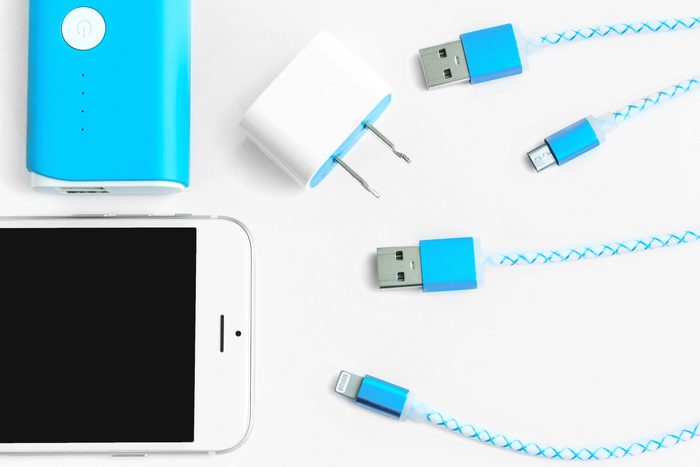
Packing batteries and battery chargers
Most of us can’t survive without our electronics. And heaven forbid we travel without such necessities as battery chargers and extension cords! But did you know that all battery packs face stringent travel guidelines? Per TSA guidelines, you can pack lithium-ion (rechargeable) batteries and portable batteries that contain lithium-ion only in carry-on baggage. But stick to batteries with no more than 100 watt hours per battery. With airline approval, you can bring two larger spare batteries—up to 160 watt hours per battery.

Carrying liquids
All air travelers must follow the TSA 3-1-1 rule for carry-on baggage. It states that liquids, gels and aerosols are limited to 3.4 ounces or less and must be placed in a single quart-size bag—one bag per passenger. There is an exception for hand sanitizer, which has a temporary 12-ounce limit because of the ongoing pandemic.
TSA officers notice when you try to skirt the rules, and this can trigger a bag search. One common mistake during the summer is bringing a super-size sunscreen to the checkpoint. That can be a costly mistake when a TSA agent confiscates it. So either pack it in your checked luggage or bring a travel-size sunscreen on the plane.
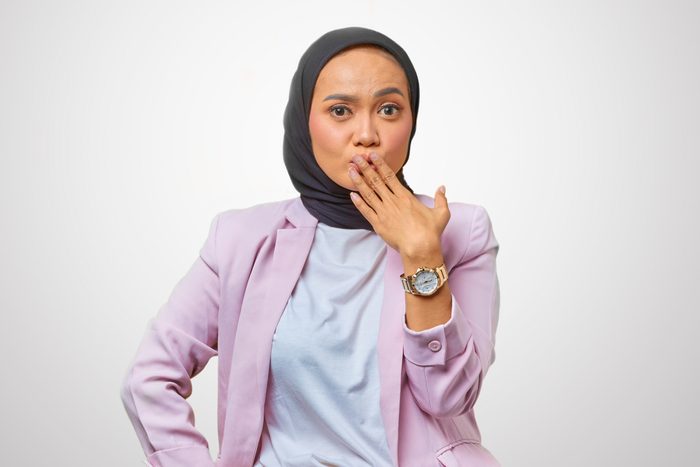
Talking about bad things
When experts warn against talking about “bad things,” they’re not referring to breakups. They’re talking about bombs and firearms. Discussing these items will absolutely get you pulled off to the side. Even asking the TSA agents about weapons—inquiring about which are allowed on a plane or why you can’t bring your gun—will get you questioned. In fact, you can get arrested for joking about bombs while in line. Pro tip: Keep quiet. Silence is definitely golden in regard to this topic.
FAQ
What do they check at airport security?
The TSA puts out a travel checklist with clear instructions for how to pack your carry-on and checked luggage to avoid issues with security at airports. Be sure to review the special instructions for items like firearms, flammables and medical equipment. TSA agents will check those as well as any liquids you’ve packed. You can pack a quart-size bag of liquids, aerosols, gels and creams in your carry-on, as long as each is no more than 3.4 ounces.
The airport security check also screens electronics. They’re among the items permitted through security, but the TSA will ask you to remove these personal items from your carry-on bag and place them into a separate bin for X-ray screening when you go through the checkpoint.
What does the TSA check for when they scan your ID?
When TSA agents ask to scan or check your ID, they want to verify your identity before you enter the security checkpoint. That’s why it’s so important to have an up-to-date license or passport. An agent will review your name, photo, address and date of birth, then cross-check to see that the information on your travel documents matches your ID.
Keep in mind that the Real ID Act is now in effect, and it aims to deter terrorists’ ability to use fake or fraudulently obtained IDs. Under the law, you need to use a state-issued ID that is Real ID compliant. You can get one through your state’s Department of Motor Vehicles. Otherwise, you can present a U.S. passport, U.S. passport card or U.S. military ID.
What triggers a TSA bag check?
Sometimes the most innocent items can spark a bag search at the airport security check—anything from lip balm and batteries to spreadable liquids like peanut butter. When an X-ray detects something in your luggage that may be suspicious, an agent needs to ferret through your bag by hand to determine what it is and whether it’s really a danger. The good news is that the TSA is rolling out an array of high-tech screening tools—think rotating 3D imagery and ID authentication—aimed at expediting the security check process.
To boost the odds you won’t set off alarm bells next time you go through airport security check, we spoke to travel experts, former TSA agents and airport security consultants to find out what actions can trigger a closer inspection.
What does TSA PreCheck look for?
This service expedites your trip through security by doing a background check on you, recording your ID and fingerprints, and checking your documents. Once this is finished you are assigned a Known Traveler Number (KTN) that you can add to your airline reservations. So what exactly is a TSA Precheck looking for?
- Any criminal history, including arrest and conviction information
- Background information, including some non-criminal records
- Checking to make sure your documents are not false or fraudulent
- Any violations of federal security regulations, such as assaulting or threating flight crew
About the experts
- Mike Delgado is a current Transportation Security Officer with more than 17 years experience. He’s worked in major international airports on the West Coast, including John Wayne Airport and LAX.
- Jeffrey Price is a former assistant security director for the Denver Airport who is now a security trainer for the American Association of Airport Executives and a professor of airport management at the Metropolitan State University of Denver.
- Richard Rozins is a former TSO.
- Sahara Rose De Vore is wellness travel coach, consultant and frequent traveler.
Why trust us
At Reader’s Digest, we’re committed to producing high-quality content by writers with expertise and experience in their field in consultation with relevant, qualified experts. For this piece on hotel etiquette, Charlotte Hilton Anderson tapped her twenty years of experience as a lifestyle and travel writer, as well as interviewed two TSOs, an airline security expert, and a travel expert. We rely on reputable primary sources, including government and professional organizations and academic institutions as well as our writers’ personal experience where appropriate. We verify all facts and data, back them with credible sourcing, and revisit them over time to ensure they remain accurate and up to date. Read more about our team, our contributors and our editorial policies.
Additional reporting by Danielle Braff.
Sources:
- Mike Delgado, current Transportation Security Officer; phone interview Sep. 26, 2024
- Jeffrey Price, security trainer for the American Association of Airport Executives and professor of airport management at the Metropolitan State University of Denver; interview Feb. 2020.
- Richard Rozins, former TSA agent; interview Feb. 2020.
- Sahara Rose De Vore, wellness travel coach, consultant and frequent traveler; interview Feb. 2020.
- Transportation Security Administration: “What Can I Bring?”
- Transportation Security Administration: “TSA introduces latest aviation security technologies in place at Las Vegas McCarran International Airport’s Innovation Checkpoint”
- Transportation Security Administration: “Precheck”
- Congress: “H.R.5357 – Unruly Passenger Restraint Review Act”
- Federal Aviation Administration: “Unruly Passengers”
- Federal Aviation Administration: “2021 Unruly Passenger Data”
- Transportation Security Administration: “AskTSA: What to Expect During a Hair Pat-Down”
Additional reporting by Danielle Braff and Lori Ioannou




















